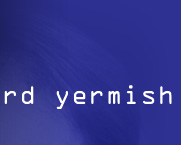Silver Reflections (2002)
mixed chorus, boys chorus, and orchestra
texts by Mark Strand and Howard Yermish
Notes on the Composition:
The expansive hints in the musical language of Mozart’s Requiem came to fruition in the huge orchestral range of the Romantics of the early 20th century in composers like Schoenberg and Scriabin, leaving essentially nowhere else to go within an ‘audible range’ and employing standard orchestral personnel. There followed a perplexed composing community asking, "what next?" and answering in a number of ways throughout the last century that very much influence today’s music. For, if it was no longer possible to expand, then perhaps musical expression would by necessity once again be found in the limited ranges and concentrated inner-focus of earlier music. And, if the range of human emotions had been apparently exhausted within that larger language, then the logical reaction would be to write music not about emotions, but about music itself, exploring the musical angles themselves, somewhat like cubism in painting. This is precisely the movement begun by the Dadaists – art about art, described through a minimal color range. Human emotions prevail, however, and French composers quickly seized on this style, if not philosophy, as a means of expression; chamber music style and repetition are just two characteristics that appealed to the composers confounded by the enormous egos of the German masters before the wars. (And, the ‘smaller’ language made economic sense during and between the wars.) Thus, the mirroring compositional style of Poulenc and the Eastern-influenced repetitions of Messaien are audible precursors of contemporary minimalists such as Philip Glass. It is into this world – our post-computer-generated, post-academic-era, musical world in which individual expression is tempered by minimalist or tonal constraints in which the relationship between music and time is always in question – that Silver Reflections, the newly commissioned work from Howard Yermish, comes to us this evening.
Poet Laureate Mark Strand titled this poem “Leopardi”, calling on the spirit of the great 18th-century Italian poet Giacomo Leopardi, who painted a naturalistic point of view of life as a state of hopelessness in which the world is relatively indifferent to the plight of humans. His poem has really nothing to do with Leopardi the man, but simply shares that worldview, a view that exposes the world without comment. Thus, in the poem we find Strand discovering the disappearance of his relationship with Jules – this revelation is also a remembrance and recalls to the author the disappearance of armies, great nations, and virtually everything that passes through the world. The poet is wounded, as the world is wounded, simply by the passing of events, and the world is indifferent to this. The composer writes:
"At the beginning of the text, Strand expresses the image of his child sleeping on a beautiful night and how "nothing at this moment bothers" his child. It is a wondrous and timeless moment that created a persistent musical flow through the entire piece. This frozen moment in time allows us to explore our own inner dialog, which as Strand expresses, is filled with the pain of being alone in the world.
"In working on the piece, I realized that I needed to use some additional words to provide an almost completely innocent perspective. I wanted Strand's words to be even more powerful and I felt that the presence of a second text would provide access to the depth of meaning in Leopardi, perhaps a meaning that most, including myself, would not experience initially when reading or hearing the text. I wanted to express how consistent the world can be and the meanings that we impose on our own version of the world can create the tragedy of our existence that allows us to feel the pain of wounds that are many years and generations old."
The musical language is indeed persistent and flowing; it is a compact use of just a very few diatonic notes that, through repetition establish ‘time,’ but deny it any urgency or forward drive. Rather, the repetition itself intoxicates the listener into experiencing repetitively the same moment, perhaps without realizing it. Indeed, each new melodic section is simply a slow ascent up a scale by steps – imperceptible and, yet, strangely devastating because the end of each of these sections finds us unchanged. Time continues, as does the music that marks its seconds, until there is no music, suddenly, like just before the performance when there was silence, and then, suddenly, music. All the while, our childhood selves, heard in the words of the composer and the sounds of the boychoir, hover close by, in our minds, waiting.
Notes by Donald Nally, Artistic Director, Choral Arts Society of Philadelphia
The Choral Arts Society of Philadelphia performed Howard Yermish's Silver Reflections on Sunday, May 19, 2002 in the Verizon Hall at the Kimmel Center. Read the interview with Howard Yermish that appeared in the Choral Arts Newsletter.
|





